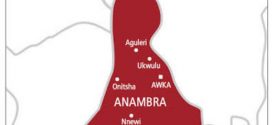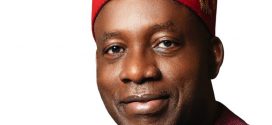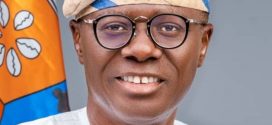The ship of State in Nigeria seems to be sliding, steeply into the abyss, without any captain available or alive to steer it for rescue. And this should be a grave cause for concern for all lovers of democracy and the rule of law. I fear now that there may indeed be a hidden agenda within the corridors of power, which is being unveiled to the people of Nigeria in stages. I can feel dictatorship in the air somehow. Please let me explain it more in some details.
MEANING OF DICTATORSHIP
A dictator is a political leader who rules over a country with absolute and unlimited power or one who circumvents extant rules, regulations and laws, against the common good. Countries ruled by dictators are called dictatorships. First applied to magistrates of the ancient Roman Republic who were granted extraordinary powers temporarily to deal with emergencies, modern dictators from Adolf Hitler to Kim Jong-un, are considered some of the most ruthless and dangerous rulers in history. The closest we have had in Nigeria was the period of the self-proclaimed maximum ruler, General Sani Abacha. A civilian dictator on the other hand, is one who rose to power through deceit, holding complete and absolute power over the armed forces, is in control of the legislators, has no regard for the judiciary, has gagged the media and does not tolerate any form of opposition.
THE STYLE OF DICTATORS
Dictators typically use military force or political deceit to gain power, which they maintain through terror, coercion, and the elimination of basic civil liberties. Often charismatic by nature, dictators tend to employ technique of bombastic mass propaganda to stir cult-like feelings of support and nationalism among the people. While dictators may hold strong political views and be supported by organized political movements, they are motivated only by personal ambition or greed to hold on to power, by all means and at all costs. They usually employ a common slogan, to gain mass appeal, creating a false sense of revolution, such as anti-corruption or the like. They crave absolute power for a limited time, allegedly to deal with social or political emergencies.
As the prevalence of monarchies declined during the 19th and 20th centuries, dictatorships and constitutional democracies became the predominant forms of government worldwide. Similarly, the role and methods of dictators changed over time. During the 19th century, various dictators came to power in Latin American countries as they became independent of Spain. These dictators, like Antonio López de Santa Anna in Mexico and Juan Manuel de Rosas in Argentina, typically raised private armies to take power from weak new national governments.
Characterized by Adolf Hitler in Nazi Germany and Joseph Stalin in the Soviet Union, the totalitarian and fascist dictators who rose to power during the first half of the 20th century were significantly different from the authoritarian rulers of postcolonial Latin America. These modern dictators tended to be charismatic individuals who rallied the people to support the ideology of a single political party like the Nazi or communist parties. Using fear and propaganda to stifle public dissent, they harnessed modern technology to direct their country’s economy to build ever-more-powerful military forces.
After World War II, the weakened governments of several countries in Eastern Europe, Asia, and Africa fell to Soviet-style communist dictators. Some of these dictators posed as hastily “elected” presidents or prime ministers who established autocratic single-party rule by quashing all opposition. Others simply used brute force to establish military dictatorships. Marked by the collapse of the Soviet Union itself in 1991, most of these communist dictatorships had fallen by the end of the 20th century.
Throughout history, even some fully constitutional governments have temporarily granted their executives extraordinary dictator-like powers during times of crisis. The dictatorships of Adolph Hitler in Germany and Benito Mussolini in Italy began under proclamations of emergency rule. During World War II, both the United States and Great Britain granted their executives extensive extra-constitutional emergency powers that were terminated with the declaration of peace. Africa in particular, has now become notorious for breeding civilian dictators, who hold on to power for decades, some even in very debilitating health conditions, rallying the people to suspend or amend their constitutions, in order to perpetuate themselves in office, even in old age and apparent senility.
THE PRACTICE OF CIVILIAN DICTATORSHIP IN NIGERIA
In 1979, General Olusegun Obasanjo handed over power to Nigeria’s first democratically elected government. The parade ending 13 years of military rule was organized by a young colonel, Abdusalam Abubakar. The elected administration was ousted in 1983, in a coup led by General Muhammadu Buhari, and the military remained in charge until 1999, when Abubakar, who by then had taken the reins, stood down in favor of Obasanjo, who had run for president as a civilian, but retained his military style of governance. Buhari himself won Nigeria’s most recent election (as a civilian) after several years of contest and he is said to be running the country through an unelected cabal, which has succeeded in circumventing all constituted authorities.
With a complacent National Assembly, which was reported recently to have passed a tax bill that it never read or saw, with the re-introduction of the social media regulation bill and the emergence of tin gods in various spheres of power, we are gradually settling down for maximum rule. Let us examine the current position of things in Nigeria.
DISREGARD FOR THE CONSTITUTION
The President informed Nigerians through the media that he was proceeding on a private visit to Saudi Arabia and thereafter to London. It is neither a vacation nor a holiday. The procedure established by the Constitution to deal with the absence of the President is for him to transmit a letter to the National Assembly, the latter being the elected representatives of the people, officially informing them of his absence. This is meant to avoid confusion and power vacuum. Up till this moment, no such letter has been transmitted to the National Assembly.
Very recently, it was reported that the Inspector-General of Police embarked upon the recruitment and promotion of policemen and women, contrary to the clear provisions of the Constitution which vests such powers on the Police Service Commission. This has virtually led to the collapse of that institution, which in law should be responsible for law and order. Several other examples abound.
CENSORSHIP AND GENERAL ATTACK ON THE MEDIA
There is a growing clamour by the executive for strict regulation of the media, for censorship and general control of media space. This usually emanates from a culture of intolerance for dissent, especially in the face of unpopular policies of government. With the trending fear of a third term agenda by the President, the general aim would seem to be to capture the media as tool for propagating the hidden agenda.
LACK OF JUDICIAL AUTONOMY AND INDEPENDENCE
The judiciary in Nigeria is firmly under the grip of the executive, which controls its funding, appointment and even removal. With the experiences of the immediate past Chief Judge of Kebbi State, who was locked out of her office and prevented from delivering a judgment, to the travails of the Chief Judge of Cross-River State, who was locked out of his official quarters and unceremoniously removed from his statutory position as Chairman of the State Judicial Service Commission, we are currently experiencing a style of imposing fear and terror upon the judiciary, as a way of cowing judges into submitting to the whims and caprices of the executive. All these coming on the heels of the removal of the erstwhile Chief Justice of Nigeria, there has now emerged a powerful executive, clothed with absolute powers beyond review by the courts. The power is real, potent and very dangerous indeed.
A FLAWED ELECTORAL SYSTEM
A people disenchanted with any style of governance can rally round and speak with the voice of rejection with their votes during the election. The conclusion of most election observers for the last (2019) general elections in Nigeria is that the electoral system was flawed and compromised virtually in all the States of the Federation. In most cases, the votes of the people could not determine the eventual winner, thus making the leader unaccountable and beyond control.
A close monitoring of the outcome of various election petitions in the tribunals and even on appeal, show a pattern of maintaining the status quo, without any major upset, from the governorship elections to the presidential. With such confidence of victory at the polls, a leader is likely to be tempted to disregard peoples’ power as expressed through the ballot, to become a ruler unto himself.
A CAPTIVE LEGISLATURE
There is no gain saying that the present National Assembly and indeed the Houses of Assembly of all the States are under the control, dominion and supervision of the executive arm of government. The idea of separation of powers supported by the robust doctrine of checks and balances, are meant to prevent absolutism in governance, especially on the part of the executive, which has control of funds, is in charge of law enforcement agencies and is directly responsible for the formulation and execution of government policies. It is the arm of government that deserves strict control and supervision, by the other arms, but that has not been the case.
As things are presently, the National Assembly is nothing but a weeping institution, whose leadership is unable to enforce its resolutions, lacks the will power to exercise its statutory powers over executive agencies and other functionaries of government. It is even encouraging executive dictatorship by inserting an ouster clause in a recent law it passed in favour of AMCON.
With the media in the kitty, the judiciary under firm grip, the legislature willing and compliant, the opposition in shambles, the labour unions only existing for wages and emoluments, with civil societies and human rights groups dead and buried, we now seem to be approaching that period that we all dread to talk about, civilian dictatorship. May this never be the lot of Nigeria, at least not in our lifetime.
 Hottestgistnaija.com
Hottestgistnaija.com



